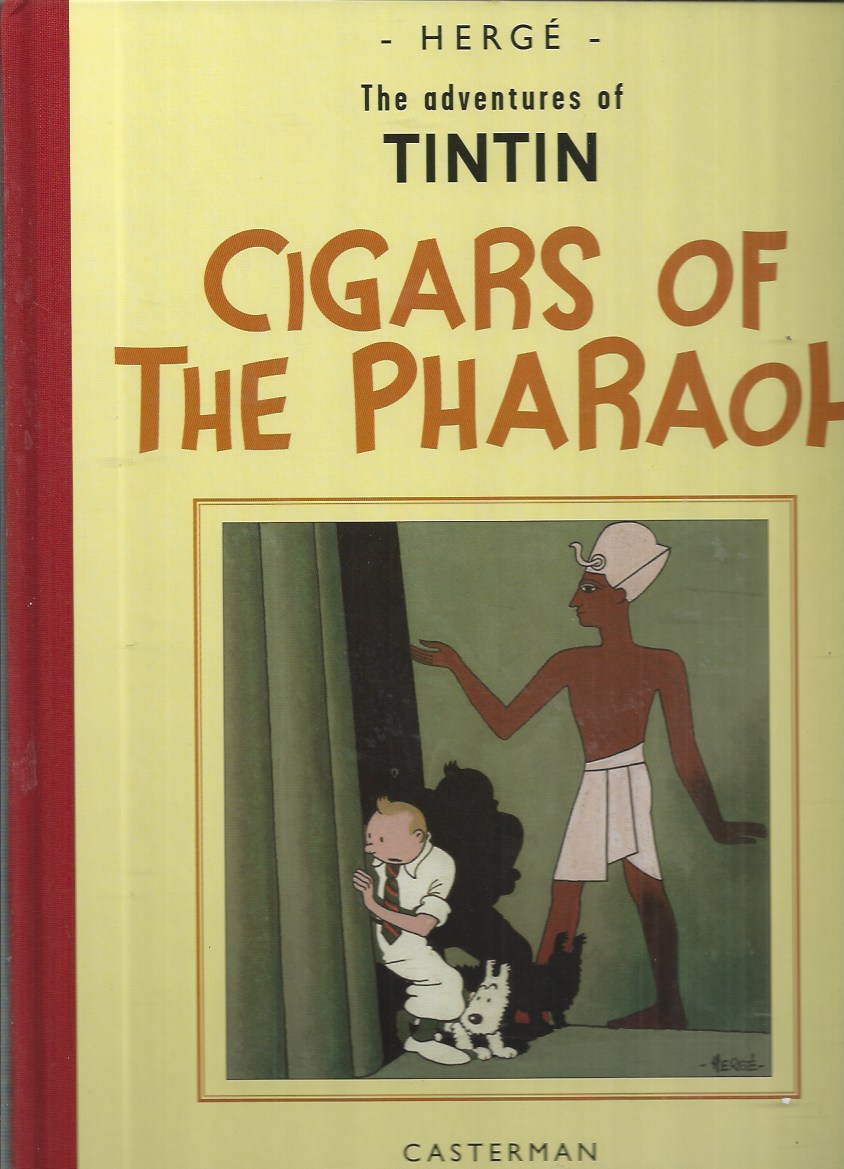Black & white facsimile / original version. Hardcover.
A BEAUTIFUL, SCARCE EDITION!
Original French title
Tintin en Orient / Les Cigares du Pharaoh
Publication history
First published in Le Petit Vingtième between 8/12 1932 and 8/2 1934.
The book appeared in 1934 (B/W, 124 pages). Redrawn in 1955.
Scores of Egyptologists have tried to find the lost tomb of the Pharaoh Kih-Oskh; every single one has vanished. When Tintin and Snowy meet the eccentric Egyptologist, Doctor Sarcophagus, they are soon involved in the search themselves—and find that the tomb contains a more sinister secret than sand and mummies. Following the clue of a mysterious symbol on a cigar band Tintin and Snowy clash with a gang of drug smugglers are off on a dizzy chase to Arabia and India, plunging headlong into another dangerous battle of wits with an international gangster.
Les Cigares du Pharaon fully marks the transitional period towards Hergé’s second stage in the development of Tintin. Although the setting of the album fits within the ‘global cycle’ of the first three albums (Russia, Africa, America, and now the Orient), the album title no longer refers to the geographical location of Tintin’s adventures. When the new story was started on 8 December 1932 in Le Petit Vingtième, it was still entitled Tintin en Orient, but Hergé clearly wanted something else and turned to the more exciting and promising title of Les Cigares du Pharaon.
This album introduces Dupont and Dupond (Thomson and Thompson) although they have; already appeared in the background of the opening scene of Tintin au Congo. In Les Cigares du Pharaon the detectives did not have a name yet; but instead were referred to as X33 and X33bis (X33 and X33A in English). Several other characters make their first appearance in this album: Rastapopoulos, Allan Thompson, and Olivier da Figueira. Rastapopoulos and Thompson will become Tintin’s enemies; da Figueira – a very convincing salesman to say the least—will become one of Tintin’s friends. Finally, Philémon Siclone is the first prototype for the later Professeur Tryphon Tournesol (Cuthbert Calculus). In contrast with the previous albums, Les Cigares du Pharaon is more than just an amalgam of events. It is clear that Hergé tried to devise a proper plot, and the album even has a plausible ending. One of the weaknesses in the plot is the way in which Tintin travels from Egypt to India: in order to make this transition plausible, Hergé lets Tintin travel by train, where he meets, not only Philémon Siclone, but also our two detectives. Furthermore, in the 1934 version traces of sensationalism (Hergé needed a cliff-hanger for his weekly episodes) can still be seen, but in the redrawn 1955 version Hergé made sure those irrelevant scenes were removed.
The story was clearly influenced by the discovery of the tomb of Tutankhamen by archeologist Howard Carter in 1922. The mysteries surrounding the tomb and Egyptian pharaohs would keep haunting Hergé, and led him to reuse some of the material for Les Sept Boules de Cristal. There was yet another influence: Paul Jamin (a friend of his brother). When Hergé met him, he was so impressed with Jamin’s artistic qualities and his sense of humor, that he hired him on the spot. Jamin helped Hergé with his work for Le Petit Vingtième, where, thanks to Jamin’s boldness and humour, even Hitler was not spared of ridicule.
#210323
